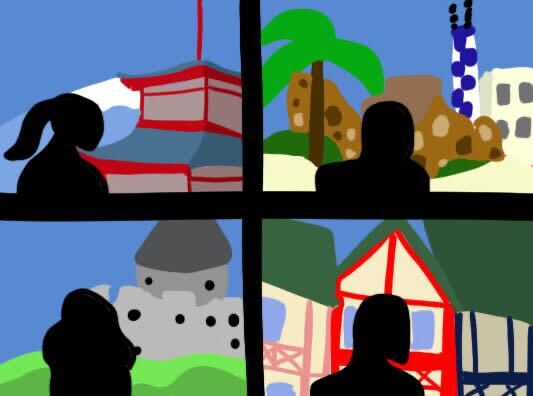Senioritis hits many DePaul students hard
DePaul University Lincoln Park campus.
Senior year is the year where a college student is supposed to have their life figured out. They have to have a job lined up before they graduate, they have to move out of their parents’ house, all while still maintaining a steady GPA. But there comes a point in a senior’s life when the pressure of having it all together becomes too much to bear. They start to lose motivation for any assignments, start to feel anxiety, and find any excuse not to do anything that involves school. This is called senioritis.
Senioritis is the supposed condition, which is not a medical condition but rather a state of being, in which a student in their final year of college starts to show a decline in motivation or performance.
Moreover, since there are no real known medical symptoms of senioritis, senioritis type behavior might vary from person to person. For example, one person could procrastinate about an assignment and end up staying up until two in the morning cleaning every inch of their room, and another person could end just procrastinating the whole day and get nothing accomplished.
Senioritis can lead to seniors being in denial about their priorities due to the growth of the stress that they are facing in their lives at the moment. The stress of facing the truth turns out to be too much for some people.
Jasmine Lowe, a recent graduate from DePaul University, experienced senioritis in her final year. “I did have senioritis,” she said. “It is inevitable, especially when you’re so close to finishing your degree, you start to get lazy. I knew I had it when I was lacking motivation to complete my assignments. But don’t worry, I still did them. I knew I had to get them done otherwise I would have wasted all the time and effort I spent before on my other classes.”
Having senioritis is not the end of the world. Having all those unanswered questions about what will happen to one’s life is completely normal. It is okay to wonder about will be about one’s life after school is over for them. It is scary to talk about those certain topics because the truth can be terrifying .
Procrastination can have negative consequences personally and academically. Despite knowing this, seniors would rather focus their attention on the dirtiness of their kitchen when then they should be focusing on that paper that is due at 11:59 p.m. and they have yet to start t.
DePaul psychology professor Joseph R. Ferrari, author of “Still Procrastinating? The No Regrets Guide To Getting It Done” commented on the nature of senioritis. “You’re going to fail,” he said. “That’s not the problem. It’s how you rise up. As you look back at your four years how did DePaul help me succeed? These four years are magical because it is your last time to fail and it is not the end of the world. Try things that they would have never done and I hope seniors have done that. What is important is what have you learned and did you leave a legacy?”
When seniors start to procrastinate again and again it eventually becomes a habit. This pattern of not caring anymore is not only a sign that senioritis has kicked in, but because a senior has internalized the fact that they are close to graduating, they cannot be bothered to care with or without that grade on that paper, because they know that they will still graduate on time.
Recent DePaul alum Jimmie Fitzhugh said he avoided senioritis throughout college and graduate school. I have never experienced senioritis in undergrad or graduate school. I knew after undergrad I was starting my master’s program at DePaul and wanted to stay motivated and finish strong,” he said. “After my master’s degree, I knew I would be studying for my state licensure and going to interviews and wanted to keep the same mindset. Working hard throughout a degree just to give up towards the end is not something I wanted to do.”
Most seniors start to feel the effects of senioritis usually in spring quarter, close to graduation. There really is no particular season or timespan that dictates when seniors feel senioritis. Seniors could feel the effects as early as the fall quarter and carry that affliction well into the winter quarter and possibly into the spring. When the holidays hit, the urge to stay home after being back hits hard. That six-week break makes it hard to want to finish out the rest of the year. Students are bombarded with questions about the future and when these questions go unanswered, panic and anxiety kicks in.
Scimone Williams, a graduate student studying communication and media at DePaul, is the president of Sister to Sista, a non-profit organization that creates a safe space for all provides advice to anyone who is stuck in this mindset.
“[In] your senior year, you are trying to make sure that you are all set to go, all your credits are finished, and everything that you need is already being fulfilled before you leave because the goal is not to have to come back for any extra classes,” Williams said.
“The goal is just to be done when you’re done.”














